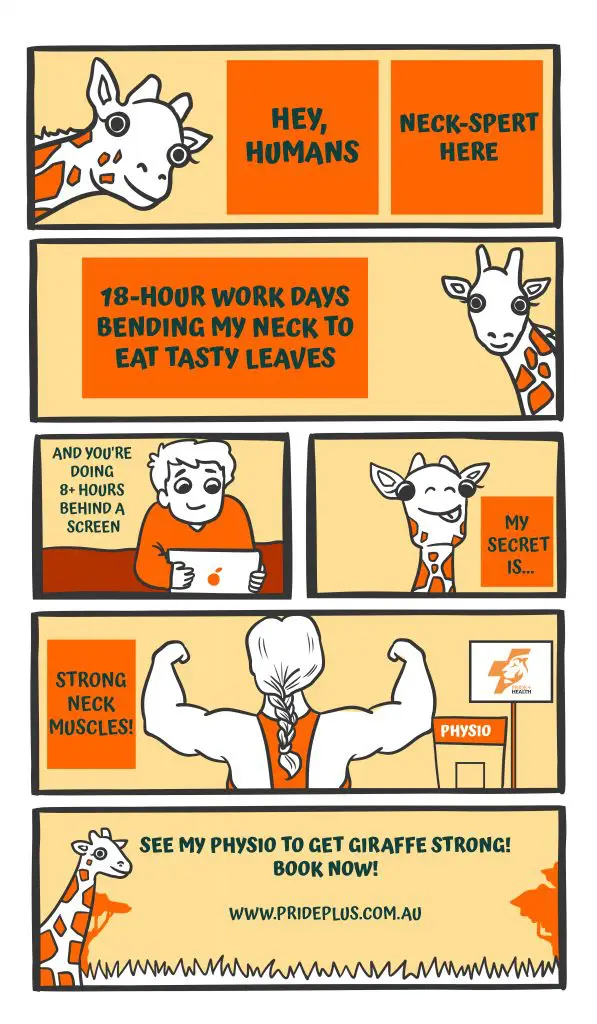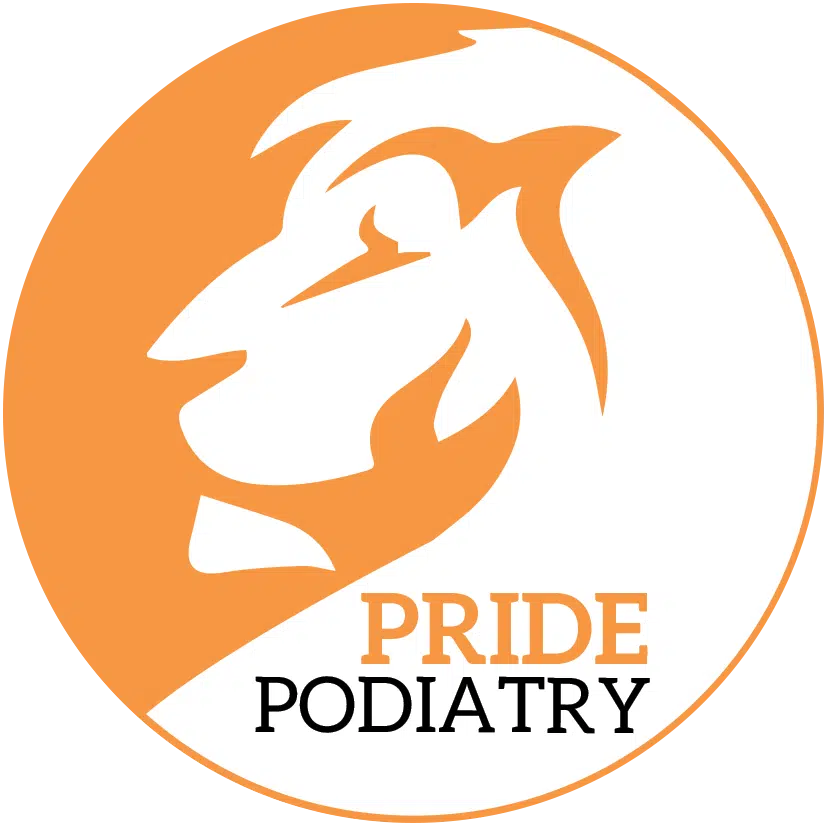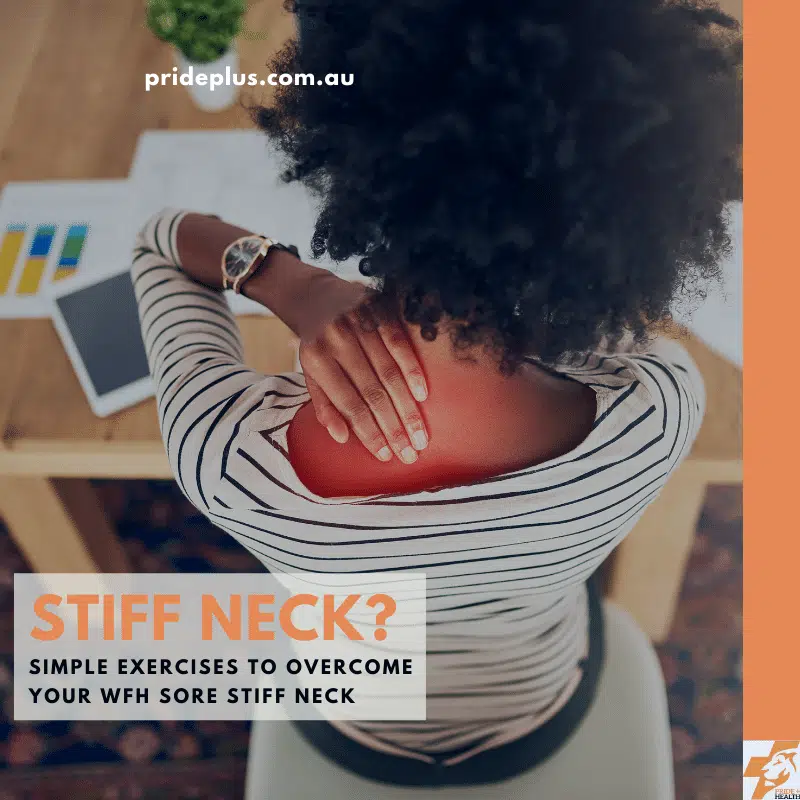Dominic, one of your friendly Pascoe Vale physiotherapists here with an update on our popular Stiff Neck guide. In our post COVID world of working from home, poor posture and zoom parties this post has become even more important to follow.
Battling a stiff neck?
Start with these exercises and book in with our physiotherapy team for your first treatment today.
Let me introduce to you our neck-spert.

Most of us humans experience a stiff neck during our lifetime. There are many (and I mean many) causes of a stiff neck but as a physiotherapist there’s a few that really stand out. These are the types of stiff neck I see in clinic most regularly.
A stiff neck from overworked neck muscles, overworked cervical joints or a combination of both.
Often a stiff neck will present on it’s own, and then other times there are other symptoms as well.
- Sensation of tightness or tension along the shoulder up through to the neck
- Burning sensation around the neck and shoulders
- Headache
- Catching pain during neck movement
- Reduced shoulder range of movement
Let’s go deeper and investigate what causes a stiff neck in us humans, what we can do about it, and can we learn a thing or two from the neck-spert Giraffe’s?
Stiff Neck From Muscle or Joint Overload
If you overload your neck with sustained stress it can become stiff. Common patterns are people who work long hours at a desk Those spending a lot of time on overhead activities where you’re looking up.
Painting a ceiling is a prime example.
Consistent overload of your neck muscles in high loading or a stationary position can lead to neck stiffness.
So what can you do about it? Think of how your arms felt sore and stiff after that first time you went to the gym. As you get stronger the soreness and tightness reduces and the threshold to tolerate load also increases.
Similarly, if you have a stiff neck, studies have found that strengthening of the neck muscles reduces neck stiffness. Another solution is simply movement.
Our bodies love moving and bending.
The last time you slept with your shoulder overhead, you woke up with shoulder pain right?
Motion is lotion for our joints so moving our neck regularly helps keep it lubricated and reduces the chance it gets stiff. Let me show you my two favourite exercises to get through some mild neck pain and stiffness.
Gentle Neck & Shoulder Stretch Video
This is a great starting point for when you have neck pain. You can even try to level up this exercise by using heating pads on your neck first, like a wheat sack to dilate your blood vessels and move a little easier.
Gentle Chin Tucks Video
Another great starting exercise for a common type of neck pain from a stiff neck. Chin tucks are especially good for seniors who get tight neck muscles or tension headaches.
Neck Sprain or Strain
Neck stiffness can also develop following acute neck sprain or strain. It could be from a sports injury, car accident or something as simple as your daily activities. In fact, you might be surprised to learn that a strain can still happen in a very low loading situation. Sleeping in an awkward position can be enough to trigger a muscle spasm and cause a strain.
As a physical therapist I’ve seen plenty of people with a stiff neck and severe neck pain and associated muscle spasm. All from their abnormal sleep position. In most of these cases, physiotherapy can provide instantaneous relief for neck stiffness.
But different management is required if your neck sprain or strain due to heavy loading.
The shoulder muscles which connect into the neck need to be assessed and strengthened if lifting awkward or unaccustomed loads strain them. These simple shoulder and neck exercises are part of the physical therapy you’ll be prescribed in many cases to overcome neck injuries.
Dumbbell Pullover Video
If you get sore muscles in your upper back then these need to become a regular exercise for you.
Monkey Shrugs Video
My all time favourite exercise to treat muscle tightness in the neck and shoulders. Shrug em.
Shoulder Strength Series
This exercise program will help build neck, shoulder and arm strength to help you prevent neck stiffness, tension headaches and live your best daily life.
Neck Structure
Our joints change as we age, this is normal.
The disc and facet joints that make up our vertebral column and facilitate movement of our spine are constantly changing. They can lose a little bit of hydration (less slippery) and flatten out. There can also be some osteoarthritis changes including bone spurs and cartilage damage. With these very normal changes happening we can lose some of our end-range movement of our neck.
An example of this is reducing the ability of our head to turn on our shoulders.
If you’re getting a few more decades under your belt, you might find it harder to “head check” in the car to see that blind spot if your neck end-range of motion is reduced. You might also feel an occasional jamming sensation.
While such structural changes are not modifiable, engaging in regular range of motion and resistance exercises can help maintain your neck mobility.
Moving on to the other end of the spectrum, there are some of us with hypermobile joints. Hypermobile joints are able to move more than the average, and even these can feel stiff!
How?
With hypermobile joints, your muscles that control neck movement actually have to work harder to provide support to the neck. The result is overloaded neck muscles which feel stiff and tight. In clinic when I measure the range of movement available of people who complain of neck stiffness, they are often normal.
And if you have hypermobile joints the range is often more. The reality is that the sensation of having a stiff neck is due to overloading rather than true shortening of the neck muscles.
Here’s a great exercise if your finding it hard to perform head checks due to a lack of neck mobility.
Trunk Extension & Rotation Video
As you can see here I’ve grabbed my single point walking stick to help me out.
What You Can Do To Fix Your Stiff Neck
Well, if your stiff neck symptom pattern fits well with the above, you will benefit from neck exercises.
Book an appointment here with our neck-spert physiotherapists to workout what is the best exercise to relieve your neck stiffness.
A few words of caution:
Any neck stiffness due to high impact trauma, or accompanied by unexplained dizziness, visual changes, fainting spells, fevers, nausea, fatigue, coordination issues, changes in mental state may indicate a serious underlying pathology and would require immediate medical attention. If there’s any suspicion of bacterial infection, viral infection then you should see urgent medical care from your doctor. Bacterial meningitis or viral meningitis are not conditions to take lightly.
This article is general advice only and not individual clinical advice. You should always consult your physiotherapist or doctor before commencing any treatment.
References
Andersen, H., Ge, H. Y., Arendt-Nielsen, L., Danneskiold-Samsøe, B., & Graven-Nielsen, T. (2010). Increased trapezius pain sensitivity is not associated with increased tissue hardness. The journal of Pain, 11(5), 491-499.
Andersen, L. L., Andersen, C. H., Skotte, J. H., Suetta, C., Søgaard, K., Saltin, B., & Sjøgaard, G. (2014). High-intensity strength training improves function of chronically painful muscles: case-control and RCT studies. BioMed research international, 2014.
About The Author

Dominic Tan is an experienced physiotherapist (physical therapist) working in Pascoe Vale. Prior to physiotherapy he has worked in strength and conditioning and massage therapy. Dominic enjoys connecting research with practice; meaning you’re stiff neck will be a thing of the past as Dom guides you through evidence based treatments.




